Reach out to the nation’s community of corporate board members to ask them about where they think the economy is headed over the next year—as we just did—and you’ll get some interesting takeaways.
The good news: A growing proportion of directors see the business landscape improving in the next 12 months—39 percent, up from 34 percent in February. The bad: The extent of that improvement is getting smaller—from a 26 percent increase in their rating on a 10-point scale to a 24 percent increase. The ugly: A growing proportion expects conditions to deteriorate over that same period—35 percent, up from 33 percent in February.
What’s behind the change won’t come as a surprise to this audience. Slowing demand, heightened geopolitical risks and the Fed’s continued tightening through the latest bank run didn’t provide much comfort to directors that the U.S. economy would rebound and avoid a recession in the coming months, as many had predicted in January.
Instead, according to the latest data collected as part of Corporate Board Member’s Director Confidence Index, a monthly survey conducted in partnership with the Diligent Institute to take the pulse of public company board members on their outlook for business, more directors now expect conditions to have worsened by this time next year (35 percent in March vs. 33 percent in February).
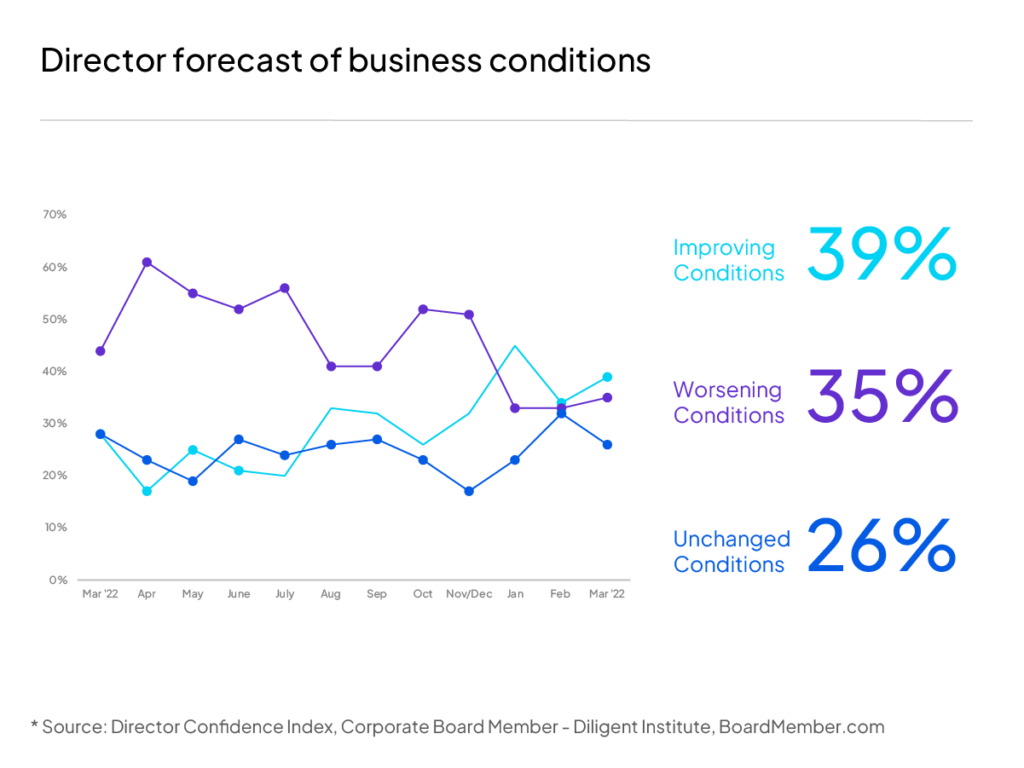
Even among the minority of directors who said they expect business conditions to have improved by March 2024, the outlook is dimming. They are forecasting conditions to be a 7.06 out of 10 by then (on a scale where 10 is excellent and 1 is poor), down from 7.21 when asked the same question just a month prior.
Still, that’s much better than the overall average. As a whole, the 185 board members polled March 20-23 rated their forecast for business 12 months out a 5.84 out of 10. That is 7 percent lower than the prior month (6.28) and more than 7 percent off March 2022 levels.
And when looking only at those directors who expect a decline, that rating drops to 4.49, well into “Weak” territory according to our scale labels. “The collapse of Silicon Valley Bank and challenges with Credit Suisse do not engender confidence,” said Barbara Higgins, an independent director on the board of Employers Holdings, adding that “the current conundrum of continuing to raise interest rates vs sending the economy into recession” is also affecting her outlook.
“The recent banking failures have business leaders very wary,” said David Frenette, a director on the board of HarborOne Bancorp. “[And] the Fed’s raising of interest rates in fighting inflation will contract the economy.”
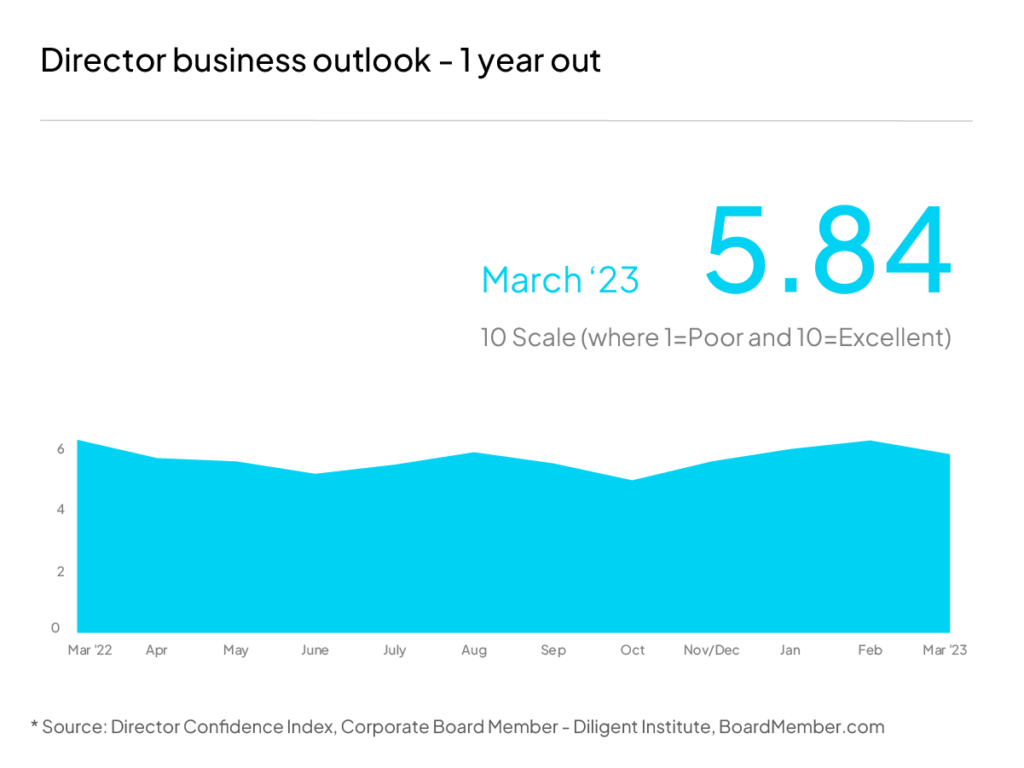
Directors’ rating of current business conditions followed a similar trajectory, regressing 5 percent to 5.84 in March, from 6.16 last month—largely due to the recent bank crisis.
“Anyone who has studied how Volker battled to tame inflation in the ’80s must be concerned about the magnitude of the task ahead of the Fed in taming the current inflation. Outside of dealing with whether real interest rates will be needed to tame inflation, historically high govt. spending will hinder the Fed’s progress on taming inflation over the coming month/years.” – Anonymous independent public company director
Overall, directors rate the impact of the Fed’s policy on their company’s ability to compete a 6 out of 10—highlighting a divide depending on the sector of activity.
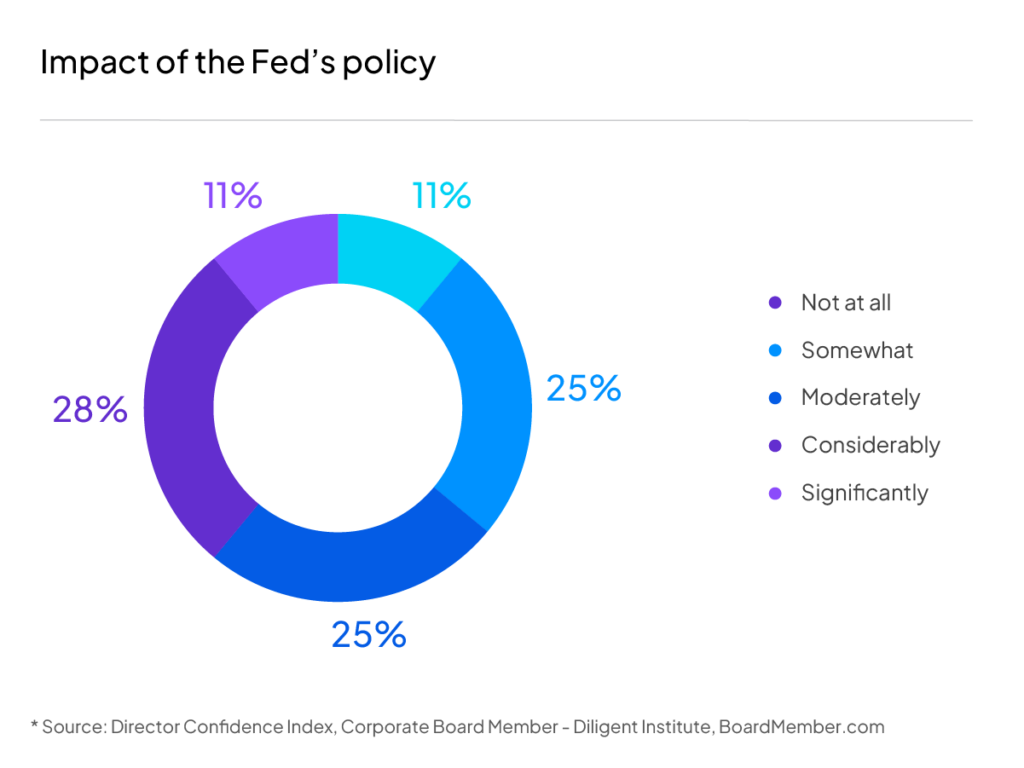
“While we may have a short-term recession, we feel like the low unemployment and high demand for goods/services will continue to fuel long-term growth and spending,” said David K. Neal, a director on the board of Aclarion.
While other directors also said demand had remained strong, certain sectors haven’t been as lucky, and many reported a slowdown they believe to have been caused by rising rates. What happens next, “everyone seems to be guessing,” said Kim Korth, a director of the board and the chair of the compensation committee at Stoneridge. “[There’s] massive uncertainty in our clients’ perception. Some key clients are down 50 percent in the first quarter, others are up 50 percent.”
Meanwhile, there are some positives beneath all of this, directors say: improvements in the supply chain, healthy capital on the sidelines, a relative slowing of wage growth, a trend to more normal unemployment and strong fundamentals are all pointing to a sign that once inflation has been tamed, growth will return. “I think there is more anxiety than is actually merited,” said a director on the board of a large energy company. “I believe despite the current optics, the Fed is succeeding in bringing inflation down.”
The year ahead
With so many complexities, it’s not easy to predict the months ahead, which may explain why directors’ forecasts have held relatively steady month over month: 61 percent continue to expect profits to increase in the coming year (up from 59 percent in February), and 68 percent said the same of increasing revenues (unchanged since February).A full third plan to increase capital expenditures over the coming year, vs. 34 percent in February.
Directors say despite their expectation for worsening conditions in the near term, most companies are being diligent about the heightened level of risks, acting with caution, increasing liquidity and delaying larger projects until there is more clarity in the market—all of which, they say, will support a strong recovery into 2024.
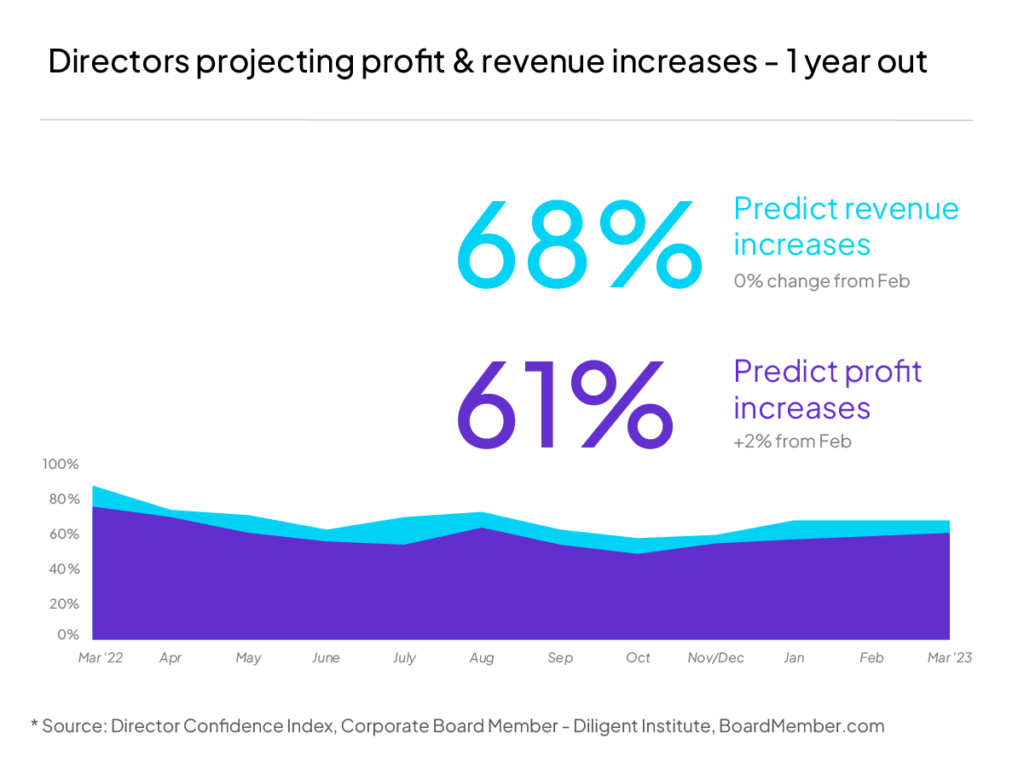
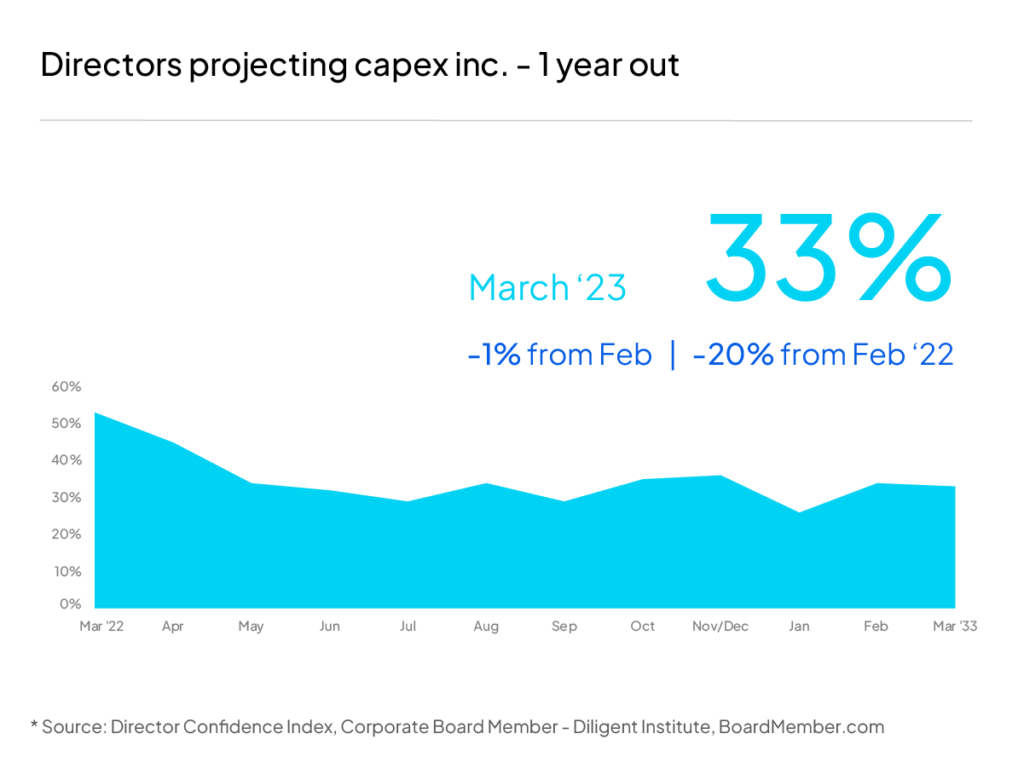
About the author
Lead Research Specialist
Kira Ciccarelli is the Lead Research Specialist of the Diligent Institute, the modern governance think tank and global research arm of Diligent Corporation. In her role, Kira researches and produces high-level modern governance reports, blog articles and podcasts designed to inform director decision-making and highlight best practices.
Before joining Diligent, Kira worked in a variety of data-driven research roles, including analyzing global aid funds to the UN Sustainable Development Goals (SDGs) and compiling a meta-analysis of political experimental findings for the Analyst Institute. She holds a BA in Public Policy from the College of William & Mary.
Related content
[rt_reading_time postfix=”minute read” postfix_singular=”minute read”]
Director Confidence Index
Director Confidence Index – April 2023
April reading of director confidence shows a reversal from March’s sharp SVB-led…
[rt_reading_time postfix=”minute read” postfix_singular=”minute read”]
Director Confidence Index
Director Confidence Index – February 2023
In February, resolving supply chain issues are fueling many directors’ improving…
[rt_reading_time postfix=”minute read” postfix_singular=”minute read”]
Inform
What Directors Think 2023
Diligent Institute and Corporate Board Member surveyed 300 U.S. public company directors…